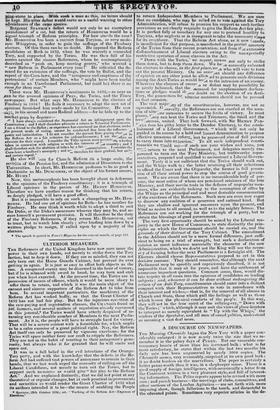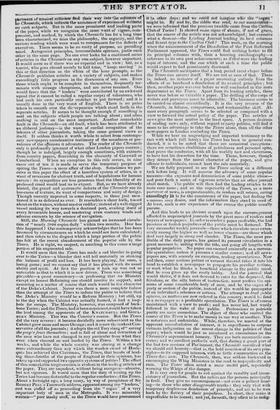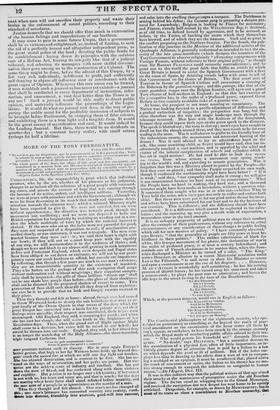A DISCOURSE ON NEWSPAPERS.
THE Morning Chronicle began the New Year with a paper con- siderably enlarged: it is now nearly twice the size that we re- member it in the palmy days of PERRY. But our venerable con- temporary boasts of more than his increased bulk : what is far more satisfactory, he states that within the last two months his daily sale has been augmented by nearly 3000 copies. The Chronicle seems, very reasonably, surprised at its own good luck : it no doubt borders on the marvellous. The paper is certainly a better penis) worth than it was, in a shopkeeper sense. There is a pied supply of foreign intelligence, with occasionally a letter from the Continent written in a very pleasant style, and full of interest- ing information. The Police reports appear to be revised with more care ; and parish business—the meetings of clubs, committees, and other sections of the London Agitation — are set forth with more imposing show, Ihough fallacious to the touch, and distasteful to the educated palate. Sometimes very superior articles in the de- THE Morning Chronicle began the New Year with a paper con- siderably enlarged: it is now nearly twice the size that we re- member it in the palmy days of PERRY. But our venerable con- temporary boasts of more than his increased bulk : what is far more satisfactory, he states that within the last two months his daily sale has been augmented by nearly 3000 copies. The Chronicle seems, very reasonably, surprised at its own good luck : it no doubt borders on the marvellous. The paper is certainly a better penis) worth than it was, in a shopkeeper sense. There is a pied supply of foreign intelligence, with occasionally a letter from the Continent written in a very pleasant style, and full of interest- ing information. The Police reports appear to be revised with more care ; and parish business—the meetings of clubs, committees, and other sections of the London Agitation — are set forth with more imposing show, Ihough fallacious to the touch, and distasteful to the educated palate. Sometimes very superior articles in the de- tilittment of musical eiriticiiinr ihtd their way into she eoinniais 0 . Tie Chronide, which indicate thwassistance of experienced writers on such subjects. But in. the more prominent and leading parte of the paper, while we recognize the same want of vigour, corn-- pression, and method, by which the Chronicle has for taong time been characterized, we miss the philosophy, the sagacity, and the curious reading which were wont to compensate for the defects of execut'on. There seems to be no unity of purpose, no presiding mind. Antagonist principles, irreconcilable opinions, jostle each other in the same page. No one ever looks for a continued series of articles in the Chronicle on any one subject, however Important. It would seem as if there was no especial end in view ; but, as a tourist, who goes abroad merely to kill time, " keeps moving " in this or that direction as the whim of the hour prompts, so the Chronicle publishes articles on a variety of subjects, and makes 'exceedingly little progress in the discussion of any one, Even those which ought to be complete in themselves, frequently ter- minate with strange abruptness, and are never resumed. One would fancy that the " leaders" were contributed by an awkward squad (for it cannot be called a regular corps) of volunteers, who had each his own particular crotchet to put forward; and it is usually done in the very worst of English. There is no pains taken to smooth over the disarepancies which stand forth in the separate articles. It seems to be thought enough if something is said on the subjects which people are talking about ; and often nothing is said on the most important. Another remarkable fault in the Chronicle—an old fault, which has been attributed to an illiberal jealousy-Lis the want of cordial recognition of the labours of other journalists, taking the same general views as itself. It seldom thinks it worth while to select from contempo- rary newspapers corroborative testimony of the soundness or pre- valence of the °Pinions it advocates. The reader of the Chronicle only is profoundly ignorant of what other London papers contain ; though he is indulged, largely enough sometimes, with extracts from country papers, flourishing in the obscurity of Cornwall or Cunaberland. When an exception to this rule occurs, in nine cases out of ten it is made to serve the temporary purpose of spiting the Times—a mere affair of the shop. Sometimes we per- ceive in this paper the effect of a heartless system of ethics, in a want of reverence for abstract truth, and of hopefulness for human nature : its sympathies are less generous than the liberality of its professed creed would lead us to expect. But, as we have already hinted, the grand and systematic defects of' the Chronicle are its looseness of texture, its want of compactness and unity of design. Though recently improved in some respects, in those just men• toned it is as deficient as ever. It resembles a sheer bulk, tossed about on the waters, without mast or rudder; instead of a well-rigged vessel making its way towards a destined port, availing itseil of every favourable breeze, and mastering even contrary winds and adverse currents by the science of navigation. Still, the Morning Chronicle has gained an increased circula- tion of "nearly 3000 copies daily 'S within two months. How has this happened ? Our contemporary acknowledges that lie has been favoured by circumstances on which he could not have calculated ; and then refers to the disgust which a large portion of the public has felt at the recent abandonment of the popular side by the Times. He is right, we suspect, in ascribing to this cause a large portion of his augmented sale. It would seem that the Times has made a sad blunder in going over to the Tories—a blunder that will tell materially in striking the balance of profit and loss. It has been playing, for once, a losing game; and we cannot say that it has played with its usual ability and spirit. At first the position it took up was not so untenable as that to which it is now driven. There was something plausible—a quasi consistency—in professing that no Ministry except an honest Reforming one should receive its support, and assuming as a matter of course that such would be the character of the Duke's Cabinet. Never was there a more complete failure than the attempt of the Times to induce the public to believe that the Duke's Ministry would be a Reform Ministry ; but still, up to the day when the Cabinet was actually formed, it had a loop- hole for escape. The Ministry, however, was composed of back- bone Tories; and the Times, had it been consistent,would have taken the lead among the opponents of the KNATCHBULL and GOUL- BURN Ministry. This was the Courier's course. But the Times did the very reverse: it became decidedly name subservient as the Cabinet grew more and more Orange; and it is now the rankest Con- servative ofall the journals; it adopts the old Tory slang of" saving .the peoye from themselves; and is full of abuse and detraction of the men who have not changed in any particular from what they were when cheered on and lauded by the Times. Within a few weeks, and while the whole country was staring at a change more extraordinary than any which the wooden sword of Harle- 9uill has achieved this Christmas, the Times, that boasts of lead- ing three-fourths of the people of England in their opinions, has taken up and supported two opposite systems of politics ! The effect of this remarkable tergiversation is evident in the leading articles of the paper. They are impudent, without being energetic—abusive, but not vigorous. It would seem that the duty of' writing up the Tories had become distasteful to the regular conductors f the Times. About a fortnight ago, a long essay, by way of paraphrase of Sir ROBERT PEEL'S Tamwortli address, appeared among the "leaders," and was puffed off as proceeding from the "organ" of a very important body of men in the Metropolis. It was miserably written--" poor trashy stuff," as the Times would have pronounced it in other days; and we could not imagine whe the "toryrtlii” might be. By and by, the riddle Was read; to our amazet we were informed that the precious twaddle came tom theCtitlfon Club of Tories It showed some signs of shame, if not of grace, that the source of the article was not acknowledged; but conceive what a descent—the Leading Journal lending its best columns and fairest type to the Canton Club ! This week, on the motning when the announcement of the Dissolution of the First Reformed Parliament appeared, the Times could find nothing better to till its principal columns with, than a boastino autobiography—a reference to its own past achievements; as if that were the leading topic of interest, and the one which at such a time the public would expect to find prominently discussed. The Chronicle anticipates that a lime period must elapse before the Times can recover itself. We are not so sure of that. There is, indeed, no instance of a paper recovering entirely from the effects of so barefaced a dereliction of its avowed principles ; but then, noother paper was ever before so well conducted in the news department as the Times. Apart from its leading articles, there never was before so valuable a paper. The drilling of the corps of writers and purveyors must be admirable. The business seems to be carried on almost scientifically. It is the very reverse of the Chronicle, in fulness, compactness, and workmanlike skill. Al- most every paragraph seems to be selected or composed with a view to forward the actual policy of the paper. The articles of news give the most matter in the least space. A person desirous of reading news only, without regard to party politics, will find it more to his advantage to take the Times alone, than all the other newspapers in London excluding the TimeS.
While we bear an ungrudging and impartial testimony to the tact with which (till lately) the Times has been in general con- ducted, it is to be noted that there are occasional exceptions: there are sometimes ebullitions of pettishness and personal spite, that prove the conductor, with all his worldly tact and cleverness, to have lost his discretion for the time. These, however, though they detract from the moral character of the paper, and give offence to individuals, cannot hurt the sale materially. We are fully prepared to see the Times sailing on a different tack before long. It will assume the advocacy of some popular measure—the exposure and denunciation of some public abuse— and pour forth a series of vigorous articles that no other journal shall match. The public will then find the leading articles to its taste once more ; and as the superiority of the Times, as a mere purveyor of news, is unquestionable, its readers will return, caring exceedingly lit le for the consistency of the paper, but finding the simmius iney desire, and the information they stand in need of. At least, such is our experience of the course the public usually pursue.
And this leads to an obvious remark upon the encouragement afforded to unprincipled journals by the great mass of readers and buyers of newspapers. Ili order to render a paper profitable, the bad passions or foolish prejudices of the public must be flattered. The very successful weekly journals—those which circulate most exten- sively among the higher as well as lower classes—are those which deal very largely in slang and slander. The Times, the most pro- fitable of the daily papers, has gained its present circulation in a great measure by sailing with the tide, and going all lengths with popular prejudices. No paper can succeed eminently as a mercan- tile speculation unless it pursues a similar course; and all news- papers are, with scarcely an exception, trading speculations. Now and then, some zealous patriot or earnest theorist takes it into his head to establish a newspaper to propagate his peculiar notions, or work what he thinks a beneficial change in the public mind. But he soon gives up the costly hobby. And the journal that would thrive, if it does not descend to cater fur the depraved, the frivolous, or the silly haters of instruction, must profess the opi- nions of some considerable body of men, and be the organ of a party or section of the public, instead of the would-be propagator of an individual's schemes or notions. The attempt to lead public opinion, as matters are now ordered in this country, would be fatal to a newspaper as a profitable speculation. The Times is of course maintaisied with a view to profit ; and has never led, but warily followed in the wake of the public. Pretensions to patriotic purity are mere moonshine. The object of those who control the course of the Times is to make money in one way or another. This is notorious and undeniable. While, therelbre, we marvel at the apparent miscalculation of interest, it is superfluous to outpour virtuous indignation on the recent change in the politics of that paper; which would be just as misplaced as encomiums on the Chronicle's supereminent honesty. They are both mercantile con- cerns; and we recollect perfectly well, that during a great part of the last two sessions of Parliament, the Chronicle sacrificed what we should call honesty—that is, the bold assertion of its own prin- ciples—to its supposed interests with as little compunction as the Times does now. The Chronicle, then, was seldom backward in encouraging the Whig Ministers in the road to unpopulatity and ruin. The Times often acted a more useful part, repeatedly warning the Whigs of the danger. It is very easy for people to rail against the venality and incon- sistency ofjournalists. But the milers are the persons principally
in fault. They give no encouragement—not even a patient hear-
ing—to those who utter disagreeable truths : they only visit with temporary displeasure dereliction of principle, and are to be won
back by the flattery of their prejudices. In short, they make it unprofitable to he honest; and yet, forsooth, they affect to be indigs nant when men will not sacrifice their property and waste their brains in the enforcement of sound politics, according to their standard of soundness.
Justice demands that we should offer thus much in extenuation of the human failings and imperfections of our brethren.
It may come to pass in some future Utopia, that a government shall be so virtuous and enlightened, as, instead of fearing, to seek
• the aid of a perfectly honest and altogether independent press, as the great moral police of the land ; devoting the public funds for its establishment ; laying down its principles with the sedulous care of a Reform Act, fencing its integrity like that of a judicial tribunal, and selecting its managers with more skilful discrimi- nation than goes among us to the construction of a Cabinet. The same thing might be done, here the advent of this Utopia, by a few very rich individuals, indifferent to profit, and sufficiently self denying to abjure all influence over or interference with the great organ of Opinion. Whenever this rare union can be formed, it may establish such a journal as has never yet existed—a journal that shall be conducted in every department of instruction, infer- illation, and amusement, a vast deal better than the Times is in any one ! Such a journal would be able really to direct public opinion, and materially influence the proceedings of the Legis- lature. It would do what no journal now does, in the way of pre- paring the public mind for the profitable discussion of subjects to - he brought before Parliament, by stripping them of false colours, and exhibiting them in a true light and a tangible form. It would be the great enemy of mystification and cant. It would indeed be the Leading Journal. But then, there would be no dividends on quarter-day ; but a constant heavy outlay, with small return Wimps for half a lifetime.
































 Previous page
Previous page